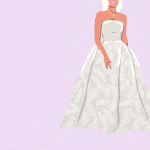WYRDO is a Glass column obsessed with finding the weirdest kinds of literature available!
From not-quite-infinite poetry to unbound books and beyond, this is the place for the most deranged writing you’ve (probably) never heard of. This edition is about SURREALISM.

How often do you dream?
Maybe that’s an odd way to begin a column about weird literature, but that’s also somewhat appropriate, no?
I dream most nights. They’re usually feverish and strange, sometimes obviously meaningful and other times cryptic. I’ve dreamed of being late for my first day of work, and of impressing people I admire. I’ve dreamed of dates going badly and of being shoved into a canvas shoe (no, really). Sometimes I don’t know what to make of them.
Let’s put a pin in that for a moment.
You’re probably most familiar with Surrealism as a visual art medium. The name Salvador Dalí comes to mind, as does his most famous painting, The Persistence of Memory: clocks draped over trees, edges and indistinct objects.
The movement itself, however, was started by French poet and professional wanker Andre Breton in the wake of the First World War. After using Freud’s psychoanalytic methods on shellshocked soldiers during the war, Breton was inspired to tap into the unconscious mind as a means to make art. After returning to Paris, he started the creatively named journal Littérature with Louis Aragon and Philippe Soupault. The three of them began to experiment with automatic writing and publishing the results in their magazine, along with accounts of their dreams.
Automatic writing (or surrealist automatism) is the practice of writing whatever comes to mind, without pausing to think or polish your work. By writing faster than your conscious mind can think, the surrealists believed they could bypass the constraints of realism and create a pure expression of the unconscious. As Breton writes in his manifesto, “Dictated by the thought, in the absence of any control exercised by reason, exempt from any aesthetic or moral concern.”
Which brings us back to dreams.
Think about your dreams (or mine, if you have none). Challenging and nonsensical as they may be, aren’t they as valid an expression of your innermost thoughts as any art? To Breton, dreams give us the ability to imagine without the limitations of reality and without the conscious rhythm of thought. In reality we spend our time assessing, where in dreams we’re expressing. Our conscious minds are more muddled, more biased, and more prone to limiting themselves. Let the mind run free with automatism and you can create in reality what you create in your wildest dreams.
If you’re interested in Surrealism, I recommend giving automatic writing a go. Think of it a bit like meditation. Find a quiet, dark place, remove all distractions, and begin to write. Do not stop, do not revise, and do not question.
Because I can’t resist, I must end by showing you Breton’s advice (published in The Surrealist Manifesto) for picking up chicks:
How to catch the eye of a woman you pass in the street
………………………………………………
………………………………………………
………………………………………………
………………………………………………
………………………………………………
Published as written, I promise.
Join me in the next WYRDO column for the return of French wankers (the Oulipo).
Brock is an experimental fiction writer based in Meanjin. His writing writhes in the gaps between weird and weirder, with an emphasis on eutopianism. He can be found at @scholteyyy in Instagram or at brockscholte.com







